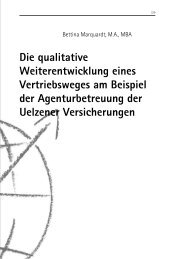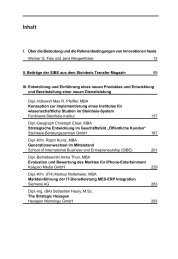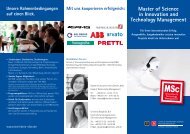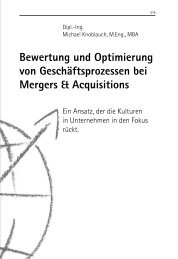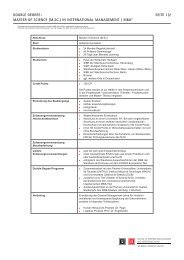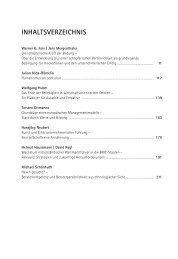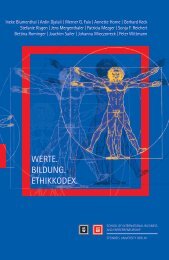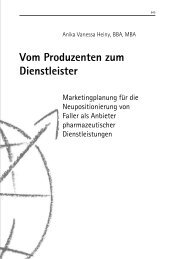- Seite 5 und 6:
STEFANIE KISGEN | ANNE DRESEN | WER
- Seite 8 und 9:
INHALTSVERZEICHNIS Editor's Preambl
- Seite 10 und 11:
FOR OUR STUDENTS
- Seite 13 und 14:
DIPL.-REG. STEFANIE KISGEN, MBA DAS
- Seite 15 und 16:
Stefanie Kisgen 1 EINLEITUNG Wandel
- Seite 17 und 18:
Stefanie Kisgen 2 MANAGEMENT Ausgan
- Seite 19 und 20:
Stefanie Kisgen Demnach müssen die
- Seite 21 und 22:
Stefanie Kisgen 3 MANAGEMENT-PROJEK
- Seite 23 und 24:
Stefanie Kisgen von 2006 auf 2008 p
- Seite 25 und 26:
Stefanie Kisgen Abbildung 4 | Entwi
- Seite 27 und 28:
Stefanie Kisgen Deutschland auf Pla
- Seite 29 und 30:
Stefanie Kisgen Abbildung 5 | New B
- Seite 31 und 32:
Stefanie Kisgen 4.3.2 ZIELE DES M.S
- Seite 33 und 34:
Stefanie Kisgen Die Ziele des M.Sc.
- Seite 35 und 36:
Stefanie Kisgen Abbildung 7 | Aufba
- Seite 37 und 38:
Stefanie Kisgen Den entsprechenden
- Seite 39 und 40:
Stefanie Kisgen Die Projektstudiena
- Seite 41 und 42:
Stefanie Kisgen Dies vorausgesetzt
- Seite 43 und 44:
Stefanie Kisgen also die auf die ei
- Seite 45 und 46:
Stefanie Kisgen 4.6 KOMPETENZENTWIC
- Seite 47 und 48:
Stefanie Kisgen Die aktivitätsbezo
- Seite 49 und 50: Stefanie Kisgen Abbildung 17 | Der
- Seite 51 und 52: Stefanie Kisgen Abbildung 18 | KODE
- Seite 53 und 54: Stefanie Kisgen Bei Abschluss des S
- Seite 55 und 56: Stefanie Kisgen Abbildung 22 | WOW-
- Seite 57 und 58: Stefanie Kisgen Schließlich ist es
- Seite 59 und 60: Stefanie Kisgen Abbildung 23 | Form
- Seite 61 und 62: Stefanie Kisgen Die Projektkolloqui
- Seite 63 und 64: Stefanie Kisgen Damit dienen die Co
- Seite 65 und 66: Stefanie Kisgen 5.1 M.SC.-LOGISTICS
- Seite 67 und 68: Stefanie Kisgen dungen bis hin zur
- Seite 69 und 70: Stefanie Kisgen individuell gestalt
- Seite 71 und 72: Stefanie Kisgen Für den M.Sc.-Logi
- Seite 73 und 74: Stefanie Kisgen vor bzw. unterstüt
- Seite 75 und 76: Stefanie Kisgen entwicklung in der
- Seite 77 und 78: Stefanie Kisgen ERPENBECK, JOHN: In
- Seite 79 und 80: Stefanie Kisgen PICHT, G.: Die deut
- Seite 81 und 82: Stefanie Kisgen ABKÜRZUNGEN Abb. A
- Seite 83 und 84: Stefanie Kisgen Anhang I: SPO M.Sc.
- Seite 85 und 86: Stefanie Kisgen Anhang II: Module u
- Seite 87: Stefanie Kisgen 76
- Seite 90 und 91: 79 Preparing Scientific Works TABLE
- Seite 92 und 93: 81 Preparing Scientific Works - App
- Seite 94 und 95: 83 Preparing Scientific Works 1.4 W
- Seite 96 und 97: 85 Preparing Scientific Works - Pro
- Seite 98 und 99: 87 Preparing Scientific Works Do I
- Seite 102 und 103: 91 Preparing Scientific Works - Dec
- Seite 104 und 105: 93 Preparing Scientific Works APPEN
- Seite 107 und 108: PROF. DR. PAED. HABIL. GÜNTER LEHM
- Seite 109 und 110: Günter Lehmann 1 DESCRIPTION Frequ
- Seite 111 und 112: Günter Lehmann - the questions sho
- Seite 113 und 114: Günter Lehmann 4 FORMS OF QUESTION
- Seite 115 und 116: Günter Lehmann - Future-oriented q
- Seite 117 und 118: Günter Lehmann Questionnaire struc
- Seite 119 und 120: Günter Lehmann 4.4 ASSESSMENT The
- Seite 121: Günter Lehmann 110
- Seite 124 und 125: 113 Presenting scientific work TABL
- Seite 126 und 127: 115 Presenting scientific work - le
- Seite 128 und 129: 117 Presenting scientific work The
- Seite 130 und 131: 119 Presenting scientific work - ap
- Seite 132 und 133: 121 Presenting scientific work - En
- Seite 134 und 135: 123 Presenting scientific work APPE
- Seite 137 und 138: PROF. DR. GÜNTER S. HEIDUK THE PUZ
- Seite 139 und 140: Günter S. Heiduk SUMMARY This chap
- Seite 141 und 142: Günter S. Heiduk list suggests evi
- Seite 143 und 144: Günter S. Heiduk Figure 2c | Share
- Seite 145 und 146: Günter S. Heiduk plain patterns of
- Seite 147 und 148: Günter S. Heiduk The exhaustibilit
- Seite 149 und 150: Günter S. Heiduk ies with a large
- Seite 151 und 152:
Günter S. Heiduk strategic allianc
- Seite 153 und 154:
Günter S. Heiduk - reciprocity: lo
- Seite 155 und 156:
Günter S. Heiduk On the monetary s
- Seite 157 und 158:
Günter S. Heiduk It is to be expec
- Seite 159 und 160:
Günter S. Heiduk roeconomic implic
- Seite 161 und 162:
Günter S. Heiduk well as a »perfe
- Seite 163 und 164:
Günter S. Heiduk Graph 1 World equ
- Seite 165 und 166:
Günter S. Heiduk If the difference
- Seite 167 und 168:
Günter S. Heiduk market. The unit
- Seite 169 und 170:
Günter S. Heiduk Box 2 Effects of
- Seite 171 und 172:
Günter S. Heiduk 3.2.5 THEORY OF I
- Seite 173 und 174:
Günter S. Heiduk This model combin
- Seite 175 und 176:
Günter S. Heiduk founded exchange
- Seite 177 und 178:
Günter S. Heiduk Figure 14 |Big Ma
- Seite 179 und 180:
Günter S. Heiduk the effect of eco
- Seite 181 und 182:
Günter S. Heiduk nologies, new com
- Seite 183 und 184:
Günter S. Heiduk - fourthly, carin
- Seite 185 und 186:
Günter S. Heiduk APPENDICES BIBLIO
- Seite 187 und 188:
Günter S. Heiduk MCKINNON R. (1963
- Seite 189 und 190:
Günter S. Heiduk TABLE OF ABBREVIA
- Seite 191 und 192:
Günter S. Heiduk Figure 2 | Ricard
- Seite 193 und 194:
Günter S. Heiduk Figure 5 | Leonti
- Seite 195:
Günter S. Heiduk Figure 8 | Effect
- Seite 198 und 199:
187 Project Management TABLE OF CON
- Seite 200 und 201:
189 Project Management SUMMARY Proj
- Seite 202 und 203:
191 Project Management 1 STANDARDS
- Seite 204 und 205:
193 Project Management The procedur
- Seite 206 und 207:
195 Project Management 2.1.1.2 PROJ
- Seite 208 und 209:
197 Project Management The followin
- Seite 210 und 211:
199 Project Management After the so
- Seite 212 und 213:
201 Project Management After enteri
- Seite 214 und 215:
203 Project Management 2.1.2.2 ROLE
- Seite 216 und 217:
205 Project Management - Establishi
- Seite 218 und 219:
207 Project Management 2.1.4 PROJEC
- Seite 220 und 221:
209 Project Management 2.1.5 KICK-O
- Seite 222 und 223:
211 Project Management The followin
- Seite 224 und 225:
213 Project Management A uniform or
- Seite 226 und 227:
215 Project Management 2.2.3 COURSE
- Seite 228 und 229:
217 Project Management No. PSP code
- Seite 230 und 231:
219 Project Management The costs of
- Seite 232 und 233:
221 Project Management - Check the
- Seite 234 und 235:
223 Project Management The project
- Seite 236 und 237:
225 Project Management Project moni
- Seite 238 und 239:
227 Project Management Milestone tr
- Seite 240 und 241:
229 Project Management 2.3.2 PROJEC
- Seite 242 und 243:
231 Project Management 2.3.3 CHANGE
- Seite 244 und 245:
233 Project Management The followin
- Seite 246 und 247:
235 Project Management 3.1 STORAGE
- Seite 248 und 249:
237 Project Management upon project
- Seite 250 und 251:
239 Project Management 4 TEACHING Q
- Seite 252 und 253:
241 Project Management 4.3.3 COURSE
- Seite 254 und 255:
243 Project Management APPENDICES T
- Seite 257 und 258:
PROF. DR. SIMONE KAUFFELD QUALITATI
- Seite 259 und 260:
Simone Kauffeld ZUSAMMENFASSUNG Die
- Seite 261 und 262:
Simone Kauffeld »Wahrnehmungsappar
- Seite 263 und 264:
Simone Kauffeld Abbildung 2 | Der F
- Seite 265 und 266:
Simone Kauffeld Der Forschungsproze
- Seite 267 und 268:
Simone Kauffeld - Messung der Wirku
- Seite 269 und 270:
Simone Kauffeld natürlicher die Un
- Seite 271 und 272:
Simone Kauffeld tung bis zur Geschw
- Seite 273 und 274:
Simone Kauffeld Feld Labor Experime
- Seite 275 und 276:
Simone Kauffeld Merkmal Qualitativ
- Seite 277 und 278:
Simone Kauffeld In der Praxis komme
- Seite 279 und 280:
Simone Kauffeld - Sie sind geeignet
- Seite 281 und 282:
Simone Kauffeld Bei der Durchführu
- Seite 283 und 284:
Simone Kauffeld und die Forscher ge
- Seite 285 und 286:
Simone Kauffeld werden. Durch diese
- Seite 287 und 288:
Simone Kauffeld Eine dritte Beobach
- Seite 289:
Simone Kauffeld BÜHNER, M. (2008).
- Seite 292 und 293:
281 Internationales Organisationsma
- Seite 294 und 295:
283 Internationales Organisationsma
- Seite 296 und 297:
285 Internationales Organisationsma
- Seite 298 und 299:
287 Internationales Organisationsma
- Seite 300 und 301:
289 Internationales Organisationsma
- Seite 302 und 303:
291 Internationales Organisationsma
- Seite 304 und 305:
293 Internationales Organisationsma
- Seite 306 und 307:
295 Internationales Organisationsma
- Seite 308 und 309:
297 Internationales Organisationsma
- Seite 310 und 311:
299 Internationales Organisationsma
- Seite 312 und 313:
301 Internationales Organisationsma
- Seite 314 und 315:
303 Internationales Organisationsma
- Seite 316 und 317:
305 Internationales Organisationsma
- Seite 318 und 319:
307 Internationales Organisationsma
- Seite 320 und 321:
309 Internationales Organisationsma
- Seite 322 und 323:
311 Internationales Organisationsma
- Seite 324 und 325:
313 Internationales Organisationsma
- Seite 326 und 327:
315 Internationales Organisationsma
- Seite 328 und 329:
317 Internationales Organisationsma
- Seite 331 und 332:
PROF. DR. HARALD MEIER INTERNATIONA
- Seite 333 und 334:
Harald Meier ZUSAMMENFASSUNG Die fo
- Seite 335 und 336:
Harald Meier Unternehmen/ Konzern G
- Seite 337 und 338:
Harald Meier Typische International
- Seite 339 und 340:
Harald Meier meru (Träger) beschä
- Seite 341 und 342:
Harald Meier - Dazu kommen 10 Mitar
- Seite 343 und 344:
Harald Meier 2 INTERNATIONALE PERSO
- Seite 345 und 346:
Harald Meier - persönliche Anforde
- Seite 347 und 348:
Harald Meier Beispiel: Rollenspiel
- Seite 349 und 350:
Harald Meier - 49% wollen keine Tre
- Seite 351 und 352:
Harald Meier Fachliche Unterstützu
- Seite 353 und 354:
Harald Meier Typische Gründe für
- Seite 355 und 356:
Harald Meier Beispiel: Kalkulation
- Seite 357 und 358:
Harald Meier - Ausgleich für dauer
- Seite 359 und 360:
Harald Meier - Internationale Ausbi
- Seite 361 und 362:
Harald Meier In internationalen Unt
- Seite 363 und 364:
Harald Meier schränkt/unbeschränk
- Seite 365 und 366:
Harald Meier mens- bzw. Mitarbeiter
- Seite 367 und 368:
Harald Meier 5 ZUSAMMENARBEIT MIT I
- Seite 369 und 370:
Harald Meier ANHANG LITERATURVERZEI
- Seite 371:
Harald Meier 360
- Seite 374 und 375:
363 Lean Management im Service INHA
- Seite 376 und 377:
365 Lean Management im Service 1 HI
- Seite 378 und 379:
367 Lean Management im Service ansp
- Seite 380 und 381:
369 Lean Management im Service indu
- Seite 382 und 383:
371 Lean Management im Service Die
- Seite 384 und 385:
373 Lean Management im Service 4 KV
- Seite 386 und 387:
375 Lean Management im Service Kund
- Seite 388 und 389:
377 Lean Management im Service Abbi
- Seite 390 und 391:
379 Lean Management im Service Abbi
- Seite 392 und 393:
381 Lean Management im Service che
- Seite 395 und 396:
PROF. TINA KLEIN, PHD WHAT IS MARKE
- Seite 397 und 398:
Tina Klein 1 INTRODUCTION This Lear
- Seite 399 und 400:
Tina Klein Ideas: Every market offe
- Seite 401 und 402:
Tina Klein - advertising is any pro
- Seite 403 und 404:
Tina Klein 5 CUSTOMERS AND MARKETS
- Seite 405:
Tina Klein APPENDICES TABLE OF FIGU
- Seite 408 und 409:
397 Die Eingliederung von Auktionen
- Seite 410 und 411:
399 Die Eingliederung von Auktionen
- Seite 412 und 413:
401 Die Eingliederung von Auktionen
- Seite 414 und 415:
403 Die Eingliederung von Auktionen
- Seite 416 und 417:
405 Die Eingliederung von Auktionen
- Seite 419 und 420:
DIPL.-ING. HANS H. STEINBECK PRODUC
- Seite 421 und 422:
Hans H. Steinbeck SUMMARY With the
- Seite 423 und 424:
Hans H. Steinbeck tronic Industry,
- Seite 425 und 426:
Hans H. Steinbeck Figure 2 | Develo
- Seite 427 und 428:
Hans H. Steinbeck ment (PDM). There
- Seite 429 und 430:
Hans H. Steinbeck 5 INTEGRATED PROD
- Seite 431 und 432:
Hans H. Steinbeck product variance
- Seite 433:
Hans H. Steinbeck APPENDICES BIBLIO
- Seite 436 und 437:
425 Logistikprozesse in einem moder
- Seite 438 und 439:
427 Logistikprozesse in einem moder
- Seite 440 und 441:
429 Logistikprozesse in einem moder
- Seite 442 und 443:
431 Logistikprozesse in einem moder
- Seite 444 und 445:
433 Logistikprozesse in einem moder
- Seite 446 und 447:
435 Logistikprozesse in einem moder
- Seite 448 und 449:
437 Logistikprozesse in einem moder
- Seite 450 und 451:
439 Logistikprozesse in einem moder
- Seite 452 und 453:
441 Logistikprozesse in einem moder
- Seite 454 und 455:
443 Logistikprozesse in einem moder
- Seite 456 und 457:
445 Logistikprozesse in einem moder
- Seite 459 und 460:
PROF. DR. WERNER G. FAIX DIPL.-REG.
- Seite 461 und 462:
Werner G. Faix | Stefanie Kisgen |
- Seite 463 und 464:
Werner G. Faix | Stefanie Kisgen |
- Seite 465 und 466:
Werner G. Faix | Stefanie Kisgen |
- Seite 467 und 468:
Werner G. Faix | Stefanie Kisgen |
- Seite 469 und 470:
Werner G. Faix | Stefanie Kisgen |
- Seite 471 und 472:
Werner G. Faix | Stefanie Kisgen |
- Seite 473 und 474:
Werner G. Faix | Stefanie Kisgen |
- Seite 475 und 476:
Werner G. Faix | Stefanie Kisgen |
- Seite 477 und 478:
Werner G. Faix | Stefanie Kisgen |
- Seite 479 und 480:
Werner G. Faix | Stefanie Kisgen |
- Seite 481 und 482:
Werner G. Faix | Stefanie Kisgen |
- Seite 483 und 484:
Werner G. Faix | Stefanie Kisgen |
- Seite 485 und 486:
Werner G. Faix | Stefanie Kisgen |
- Seite 487 und 488:
Werner G. Faix | Stefanie Kisgen |
- Seite 489 und 490:
Werner G. Faix | Stefanie Kisgen |
- Seite 491 und 492:
Werner G. Faix | Stefanie Kisgen |
- Seite 493 und 494:
Werner G. Faix | Stefanie Kisgen |
- Seite 495 und 496:
Werner G. Faix | Stefanie Kisgen |
- Seite 497 und 498:
Werner G. Faix | Stefanie Kisgen |
- Seite 499 und 500:
Werner G. Faix | Stefanie Kisgen |
- Seite 501 und 502:
Werner G. Faix | Stefanie Kisgen |
- Seite 503 und 504:
Werner G. Faix | Stefanie Kisgen |
- Seite 505 und 506:
Werner G. Faix | Stefanie Kisgen |
- Seite 507 und 508:
Werner G. Faix | Stefanie Kisgen |
- Seite 509 und 510:
Werner G. Faix | Stefanie Kisgen |
- Seite 511 und 512:
Werner G. Faix | Stefanie Kisgen |
- Seite 513 und 514:
Werner G. Faix | Stefanie Kisgen |
- Seite 515 und 516:
Werner G. Faix | Stefanie Kisgen |
- Seite 517 und 518:
Werner G. Faix | Stefanie Kisgen |
- Seite 519 und 520:
Werner G. Faix | Stefanie Kisgen |
- Seite 521 und 522:
Werner G. Faix | Stefanie Kisgen |
- Seite 523 und 524:
Werner G. Faix | Stefanie Kisgen |
- Seite 525 und 526:
Werner G. Faix | Stefanie Kisgen |
- Seite 527 und 528:
Werner G. Faix | Stefanie Kisgen |
- Seite 529 und 530:
Werner G. Faix | Stefanie Kisgen |
- Seite 531 und 532:
Werner G. Faix | Stefanie Kisgen |
- Seite 533 und 534:
Werner G. Faix | Stefanie Kisgen |
- Seite 535 und 536:
Werner G. Faix | Stefanie Kisgen |
- Seite 537:
Werner G. Faix | Stefanie Kisgen |
- Seite 540 und 541:
529 Die Attraktivität von Unsicher
- Seite 542 und 543:
531 Die Attraktivität von Unsicher
- Seite 544 und 545:
533 Die Attraktivität von Unsicher
- Seite 546 und 547:
535 Die Attraktivität von Unsicher
- Seite 548 und 549:
537 Die Attraktivität von Unsicher
- Seite 550 und 551:
539 Die Attraktivität von Unsicher
- Seite 552 und 553:
541 Die Attraktivität von Unsicher
- Seite 554 und 555:
543 Die Attraktivität von Unsicher
- Seite 556 und 557:
545 Die Attraktivität von Unsicher
- Seite 559 und 560:
PROF. DR. JONAS F. PUCK DIPL.-KFM.
- Seite 561 und 562:
Jonas F. Puck | Alexander Wisgickl
- Seite 563 und 564:
Jonas F. Puck | Alexander Wisgickl
- Seite 565 und 566:
Jonas F. Puck | Alexander Wisgickl
- Seite 567 und 568:
Jonas F. Puck | Alexander Wisgickl
- Seite 569 und 570:
Jonas F. Puck | Alexander Wisgickl
- Seite 571 und 572:
Jonas F. Puck | Alexander Wisgickl
- Seite 573 und 574:
Jonas F. Puck | Alexander Wisgickl
- Seite 575 und 576:
Jonas F. Puck | Alexander Wisgickl
- Seite 577:
Jonas F. Puck | Alexander Wisgickl
- Seite 580 und 581:
569 Internationalisierungsphasen mi
- Seite 582 und 583:
571 Internationalisierungsphasen mi
- Seite 584 und 585:
573 Internationalisierungsphasen mi
- Seite 586 und 587:
575 Internationalisierungsphasen mi
- Seite 588 und 589:
577 Internationalisierungsphasen mi
- Seite 590 und 591:
579 Internationalisierungsphasen mi
- Seite 592 und 593:
581 Internationalisierungsphasen mi
- Seite 594 und 595:
583 Internationalisierungsphasen mi
- Seite 596 und 597:
585 Internationalisierungsphasen mi
- Seite 598 und 599:
587 Internationalisierungsphasen mi
- Seite 600 und 601:
589 Internationalisierungsphasen mi
- Seite 602 und 603:
591 Internationalisierungsphasen mi
- Seite 604 und 605:
593 Internationalisierungsphasen mi
- Seite 606 und 607:
595 Internationalisierungsphasen mi
- Seite 608 und 609:
597 Internationalisierungsphasen mi
- Seite 611 und 612:
UNIV.-PROF. DR. MARTIN K. WELGE | P
- Seite 613 und 614:
Martin K. Welge | Marc Eulerich ZUS
- Seite 615 und 616:
Martin K. Welge | Marc Eulerich Ord
- Seite 617 und 618:
Martin K. Welge | Marc Eulerich und
- Seite 619 und 620:
Martin K. Welge | Marc Eulerich 4 A
- Seite 621 und 622:
Martin K. Welge | Marc Eulerich Abb
- Seite 623 und 624:
Martin K. Welge | Marc Eulerich mer
- Seite 625 und 626:
Martin K. Welge | Marc Eulerich 7 F
- Seite 627 und 628:
Martin K. Welge | Marc Eulerich KNO
- Seite 629:
Martin K. Welge | Marc Eulerich 618
- Seite 632 und 633:
621 Ausgewählte Themen einer M&A T
- Seite 634 und 635:
623 Ausgewählte Themen einer M&A T
- Seite 636 und 637:
625 Ausgewählte Themen einer M&A T
- Seite 638 und 639:
627 Ausgewählte Themen einer M&A T
- Seite 640 und 641:
629 Ausgewählte Themen einer M&A T
- Seite 642 und 643:
631 Ausgewählte Themen einer M&A T
- Seite 644 und 645:
633 Ausgewählte Themen einer M&A T
- Seite 646 und 647:
635 Ausgewählte Themen einer M&A T
- Seite 648 und 649:
637 Ausgewählte Themen einer M&A T
- Seite 650 und 651:
639 Ausgewählte Themen einer M&A T
- Seite 652 und 653:
641 Ausgewählte Themen einer M&A T
- Seite 654 und 655:
643 Ausgewählte Themen einer M&A T
- Seite 657 und 658:
PROF. DR. HARLEY KROHMER PROF. DR.
- Seite 659 und 660:
Harley Krohmer | Reto Hofstetter |
- Seite 661 und 662:
Harley Krohmer | Reto Hofstetter |
- Seite 663 und 664:
Harley Krohmer | Reto Hofstetter |
- Seite 665 und 666:
Harley Krohmer | Reto Hofstetter |
- Seite 667 und 668:
Harley Krohmer | Reto Hofstetter |
- Seite 669 und 670:
Harley Krohmer | Reto Hofstetter |
- Seite 671:
Harley Krohmer | Reto Hofstetter |
- Seite 674 und 675:
663 Ulli Arnold PROF. DR. DR. H. C.
- Seite 676 und 677:
665 Wolfgang Cronenbroeck DR. DIPL.
- Seite 678 und 679:
667 Dirk Engelhardt PROF. DR. DIRK
- Seite 680 und 681:
669 Werner G. Faix PROF. DR. WERNER
- Seite 682 und 683:
671 Philipp Glaser-Gallion DIPL.-KF
- Seite 684 und 685:
673 Stefan Heidenreich DIPL.-KFM. S
- Seite 686 und 687:
675 Simone Heilmann SIMONE HEILMANN
- Seite 688 und 689:
677 Dirk Holtbrügge UNIV.-PROF. DR
- Seite 690 und 691:
679 Stefanie Kisgen DIPL.-REG. STEF
- Seite 692 und 693:
681 Harley Krohmer PROF. DR. HARLEY
- Seite 694 und 695:
683 Bettina Lis DR. BETTINA LIS Dr.
- Seite 696 und 697:
685 Klaus Miller DR. KLAUS MILLER K
- Seite 698 und 699:
687 Jonas Puck PROF. DR. JONAS F. P
- Seite 700 und 701:
689 Wolfgang Schnellbächer DIPL.-K
- Seite 702 und 703:
691 Hans H. Steinbeck DIPL.-ING. HA
- Seite 704 und 705:
693 Alexander Wisgickl DIPL.-KFM. (




